5 travel mistakes to avoid in 2024
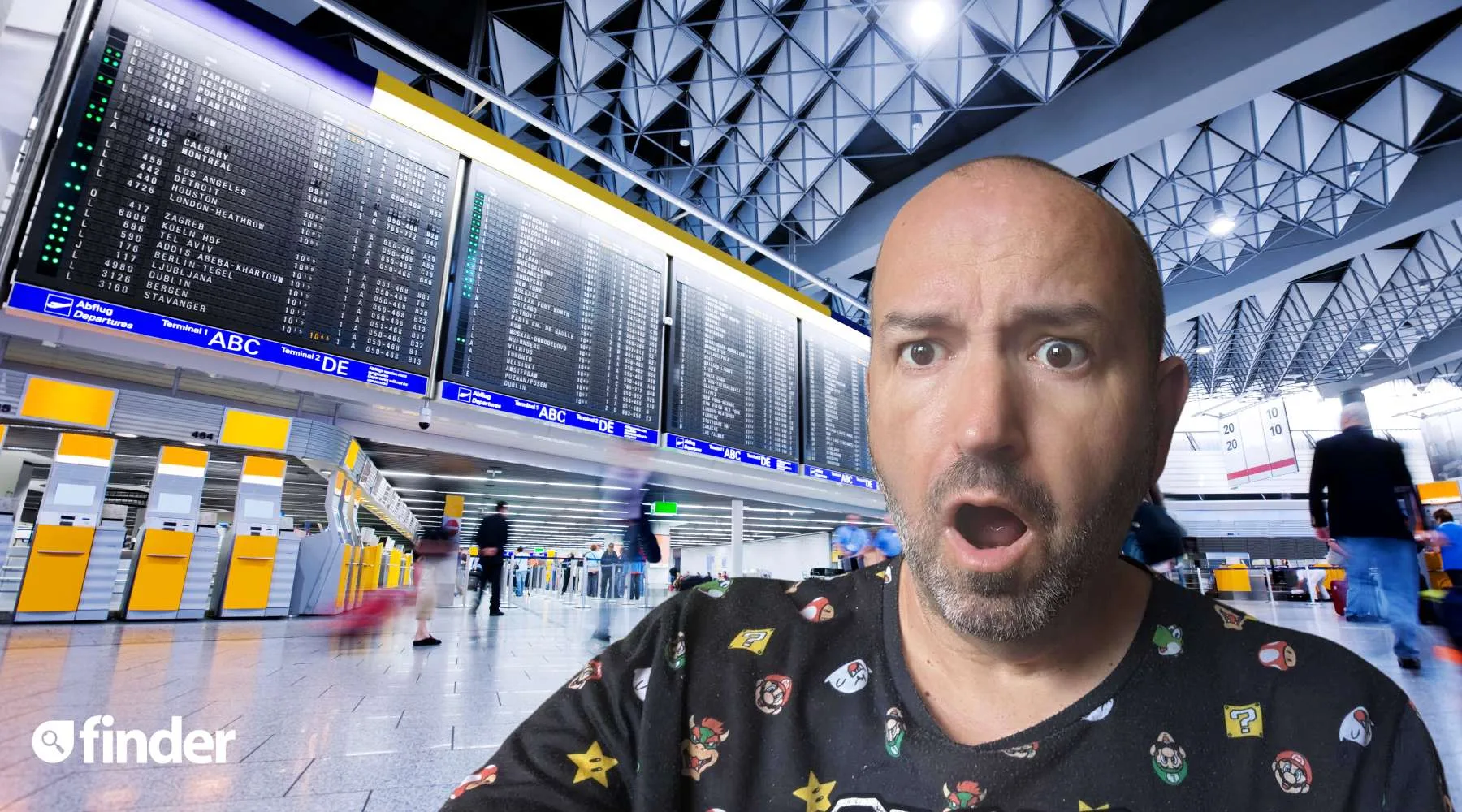
Airlines can do better - but so can passengers. Here's how to travel more smoothly in 2024.
Seth Kugel, the travel advice columnist for the New York times, recently penned a terrific piece entitled 'Help! It's Almost 2024 and Travelers Keep Making the Same Mistakes', in which he recounted some of the recurring errors he keeps advising readers about.
It's no different here in Australia - the same problems with travel keep coming up, though some of the answers are different down under. So here are my top mistakes to avoid, based on the questions I've been asked all year, plus what I've observed on my own extensive trips.
Mistake #1: Not allowing enough time for connecting flights
Few folks like hanging around airports, but missing your next flight is way worse. I recall sitting in Albury earlier this year waiting for a delayed flight to Sydney, watching fellow travellers who were booked on a connecting flight overseas increasingly freak out as it became clear they were going to miss an entire day of their holiday. The airline put them up overnight and rebooked them the next day, but that didn't make up for losing a whole night of their trip.
These are my rules of thumb for connecting flights:
- For connecting but separate domestic flights, I'd want a minimum of 60 minutes between one flight landing and the next taking off (and 90 minutes is better).
- For connecting but separate international services (whether that's to head onto another international flight, or onto a domestic service where I've landed) I'd up that to a minimum of 3 hours. Customs can be super-slow at busy times, even assuming your flight is on time.
Note that this is assuming the same airline throughout, and that the airline will transfer the luggage. If I was using a non-connecting airline (such as Jetstar or Ryanair), I'd add another hour or two.
Check airports carefully too - I've had bookings in the UK with one flight coming into Heathrow and another departing Gatwick, which means at least 2 hours just getting between the airports.
Note that airlines can offer you tight connecting bookings, but that doesn't mean you have to take them. Here's an example: Melbourne to Coffs Harbour via Sydney. Qantas happily offers this option, with just 40 minutes between one flight landing and the other taking off.
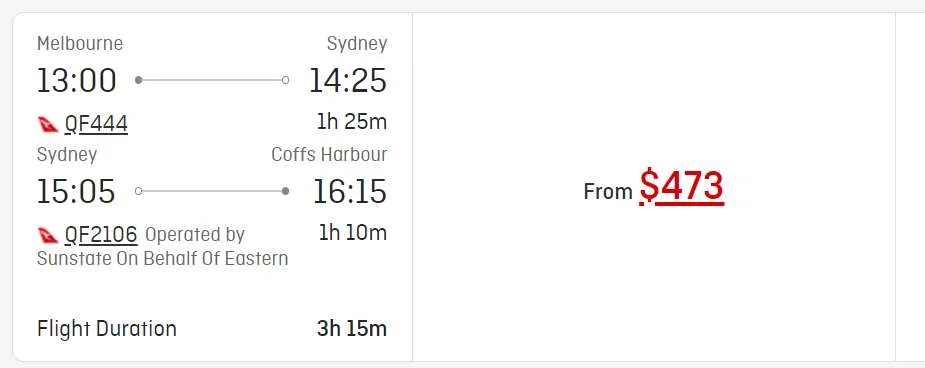
But just 30 minutes delay on the ground in Melbourne would likely ruin that flight. Scrolling down, I can see a booking which uses the same Sydney-Coffs afternoon service, but gives me the 90 minutes between flights I'm keen for. And it's actually a little cheaper.
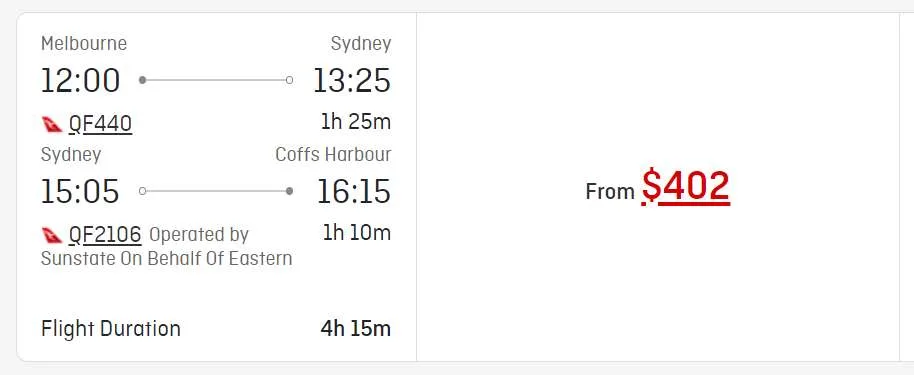
Would I prefer the direct flight on QF1572 earlier in the day to either of those? Absolutely. But if I have to connect, I'm going to allow plenty of padding.
Mistake #2: Assuming "last minute" means "cheap"
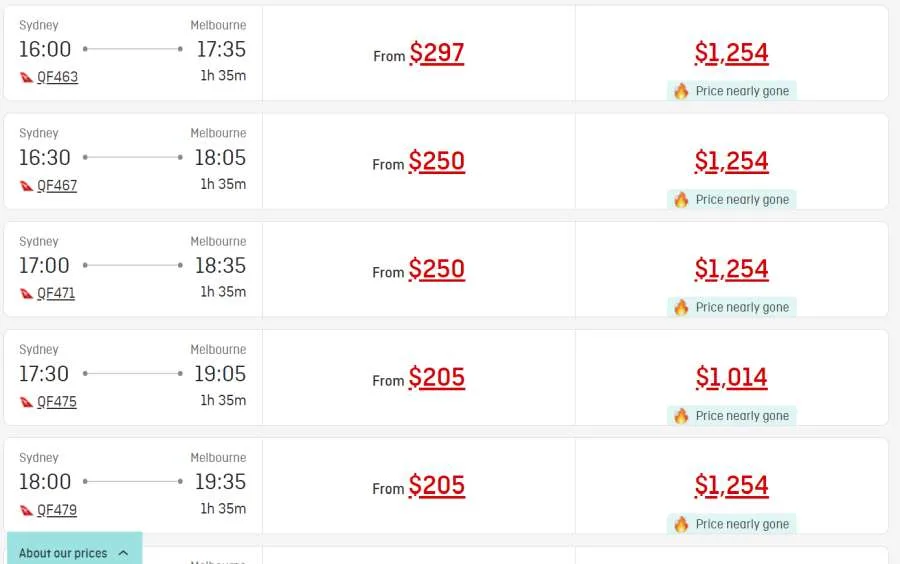
It's a simple rule: if you want a cheap seat, book it far in advance. The notion that airlines will release cheap fares at the last minute is, in Australia, largely not true. Yes, just occasionally Jetstar will offer a super-cheap last-minute option in its weekly Friday sale. But for high-demand locations, you need to be planning further ahead.
The most recent flight sales we've seen in Australia are offering good discounts for the second half of 2024. Fortune very much favours the organised.
Since the pandemic, flight prices have trended upwards. Finder's Travel Inflation Report shows international fares are up 33%, while domestic fares have risen 19% comparing pre-pandemic to now. That doesn't mean bargains don't exist, but they're not constantly appearing at the last minute.
Mistake #3: Not comparing the total cost of flights
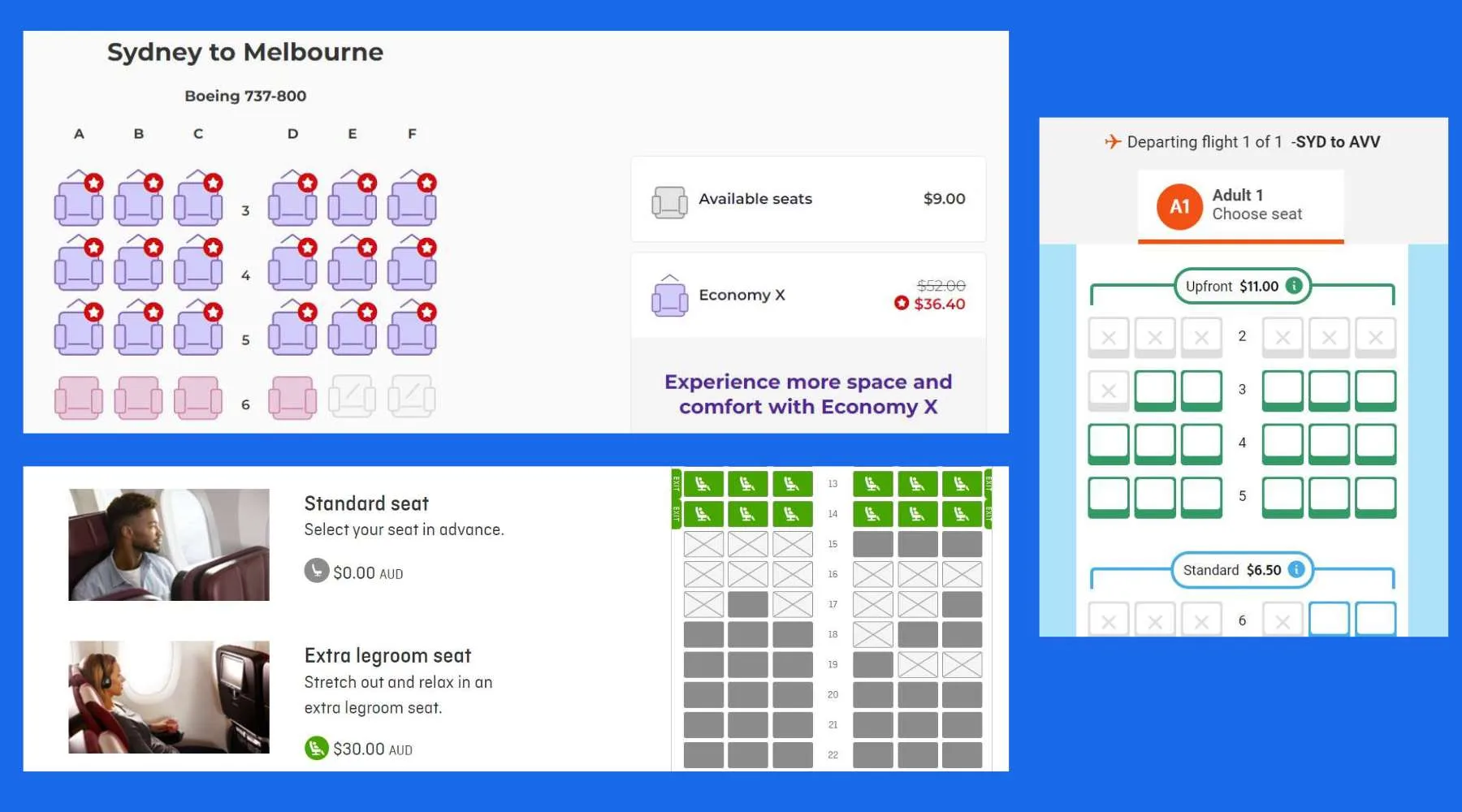
No matter which airline you choose, picking the best seat will cost extra.
In Australia, it's illegal to advertise a flight fare that doesn't include compulsory taxes and charges. But the cheapest seat you see doesn't have to include all the services offered. Baggage, seat selection, meals and even early boarding can all attract extra charges, and those can quickly add up.
This used to be more common with discount airlines, but these days they virtually all do it to some extent. The cheapest Virgin fare (Lite) doesn't include baggage or seat selection, for instance.
How much difference can it make? Jetstar's recent "Day After Christmas" sale had Sydney-Melbourne (Avalon) fares for $34, which is a common sale fare price for that route. Add in 15kg of checked luggage ($23) and basic seat selection ($5.50) and you've nearly doubled the price.
It's an error that really catches people out. Amongst Australians who've tried low-cost carriers, 16% have been stung by unexpected fees and charges, Finder research shows.
That doesn't mean you have to pay for all the extras. For a weekend away, I can easily skip checked luggage and just have 7kg of hand luggage - but I do pack carefully, and I don't assume the airline won't check the weight!
Mistake #4: Forgetting to get insurance
Again, this is a real trend. Finder research indicates that 15% of us have deliberately skipped travel insurance when booking a flight. Frankly, that's madness. One night in a US hospital (for instance) can set you back literally thousands of dollars. Insurance against medical mishaps and stolen luggage is essential. You should book it as soon as you book the holiday.
Shopping around is crucial. Compare travel insurance policies and pick one that's right for you. If you're having a cheap and cheerful trip to Bali, you might not need lots of lost luggage cover, for instance.
Mistake #5: Spending your points on "points plus play" flights
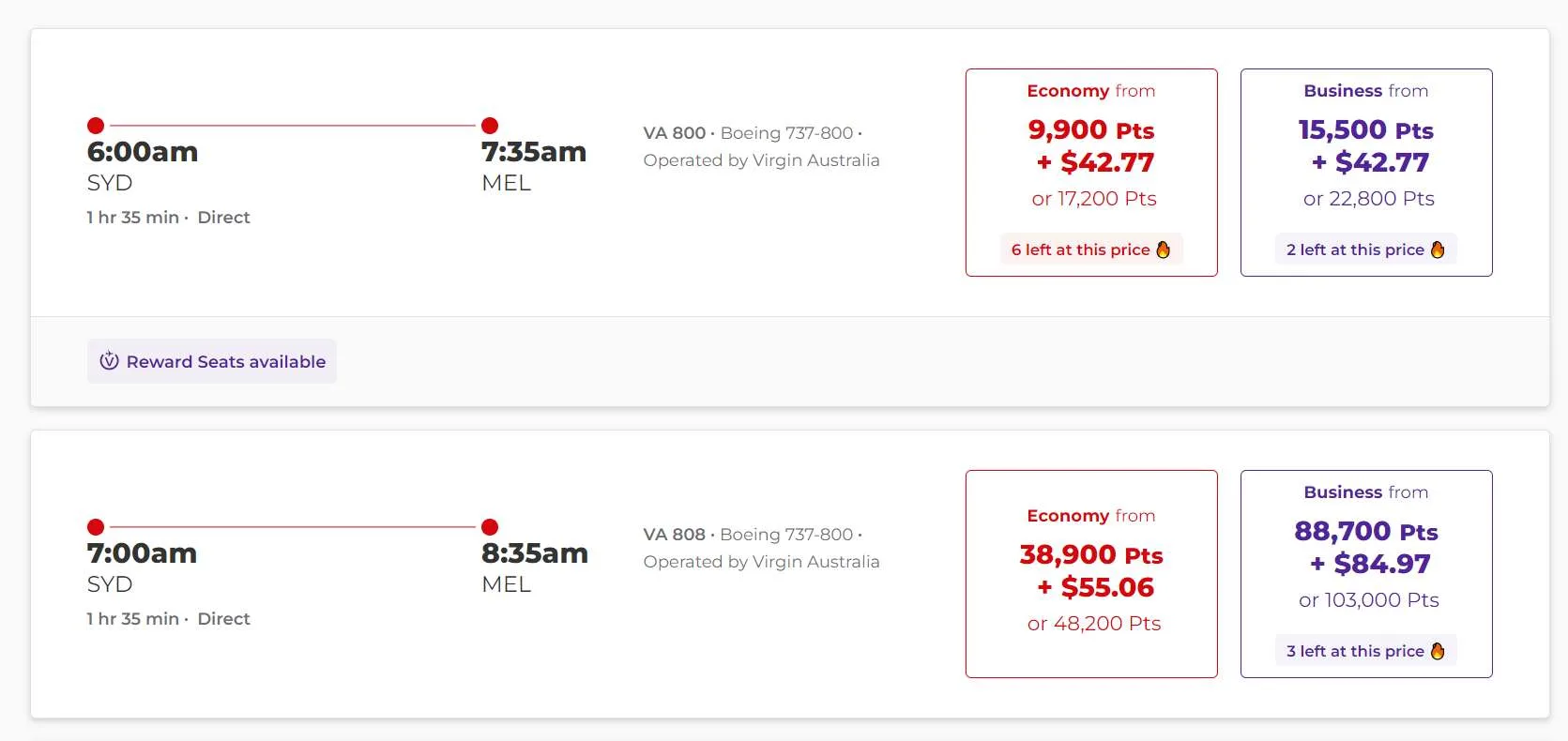
OK, this is a personal bugbear, but I really hate it. If you spend your points on a domestic Classic Reward (Qantas) or Reward (Virgin), you'll get at least $15 in value for every 1,000 points. If you plump for a "points plus pay" option, that can drop to less than $2. It's just not a wise way to use points. Make them really work for you!
Want to keep your frequent flyer points balance growing? Check out the latest credit card sign-up deals.
Sources
Ask a question
